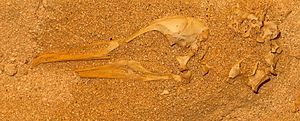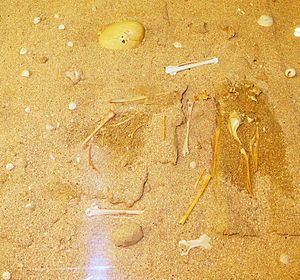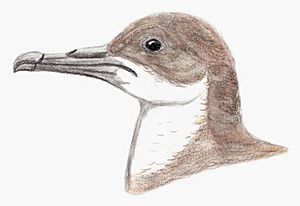Dune shearwater facts for kids
Quick facts for kids Dune shearwaterTemporal range: Late Pleistocene-Holocene
|
|
|---|---|
 |
|
| Skull and neck | |
| Scientific classification |
|
| Kingdom: | Animalia |
| Phylum: | Chordata |
| Class: | Aves |
| Order: | Procellariiformes |
| Family: | Procellariidae |
| Genus: | Puffinus |
| Species: |
P. holeae
|
| Binomial name | |
| Puffinus holeae Walker, Wragg & Harrison 1990
|
|
| Script error: The function "autoWithCaption" does not exist. | |
Script error: No such module "Check for conflicting parameters".
The dune shearwater (Puffinus holeae) was a type of seabird. It was also called the Canarian shearwater or Hole's shearwater. This bird lived in the Canary Islands, which are a group of islands in the North Atlantic Ocean.
The dune shearwater was a medium-sized bird. It was bigger than the Manx shearwater but smaller than Cory's shearwater. It got its name because it built its nests in sandy dune areas. This was different from another bird, the lava shearwater, which nested in rocky lava fields.
Sadly, the dune shearwater is now extinct. It disappeared about 2000 to 3000 years ago. This happened around the same time that the first people, called the Guanches, settled on the Canary Islands. Scientists believe that hunting by humans was the main reason this bird died out.
Contents
Discovering the Dune Shearwater
The dune shearwater is known to us today because of its fossils. These are the preserved remains of ancient living things. Scientists have found these fossils in the Canary Islands. They have also found them in a place called Figueira Brava cave in Portugal.
Honoring Jean Hole
The scientific name for the dune shearwater is Puffinus holeae. The second part of its name, holeae, is a special way to honor someone. It was named after Mrs. Jean Hole. She was the person who found many of the bird's fossils. She discovered these important fossils on the Jandia Peninsula of Fuerteventura, one of the Canary Islands.
Where It Lived
The main home of the dune shearwater was the Canary Islands. These islands are located off the northwest coast of Africa. They are known for their unique wildlife. The dune shearwater was an important part of the island's ecosystem for a long time.
Nests in the Dunes
Unlike some other seabirds, the dune shearwater preferred to nest in dune fields. These are areas with large piles of sand shaped by the wind. They would dig burrows in the sand to lay their eggs and raise their young. This nesting habit gave the bird its common name.
Why It Disappeared
The dune shearwater went extinct a long time ago. This happened between 2000 and 3000 years in the past. This period matches when the first humans arrived in the Canary Islands.
Human Impact
Scientists believe that human activities led to the extinction of the dune shearwater. When people settled on the islands, they likely hunted these birds for food. The birds were probably easy to catch because they nested on the ground in large groups. This hunting pressure was too much for the population to survive.
See also
 In Spanish: Pardela canaria de las dunas para niños
In Spanish: Pardela canaria de las dunas para niños



